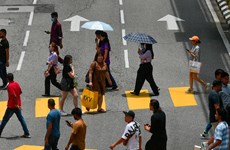Strategic trust - Foundation of “ASEAN common house”
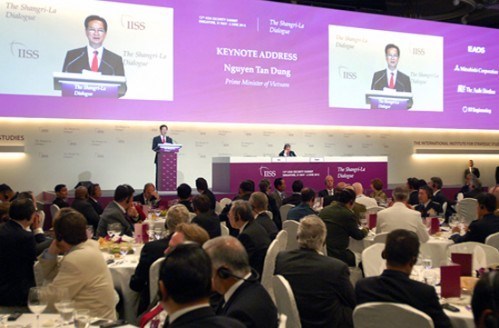 Prime Minister Nguyen Tan Dung speaks at the 12th Shangri-La Dialogue in Singapore in 2013 (Source: VNA)
Prime Minister Nguyen Tan Dung speaks at the 12th Shangri-La Dialogue in Singapore in 2013 (Source: VNA)Hanoi (VNA) - After years of speeding up the building of three pillars, the Political-Security Community, Economic Community and Socio-Cultural Community, with specific priorities, the Association of Southeast Asian Nations (ASEAN) member countries are moving closer to their goal of establishing the ASEAN Community on December 31, 2015. To achieve this goal, the association must build up, strengthen and maintain the bloc’s unity. And strategic trust, among others, is considered the solid foundation of the “ASEAN common house.”
In his speech delivered at the 12th Shangri-La Dialogue in Singapore in May 2013, Vietnamese Prime Minister Nguyen Tan Dung repeatedly mentioned the words “strategic trust” to affirm that “Trust is the origin of all friendly and co-operative relations and an effective way to prevent calculations that might cause conflicts.”
Prime Minister Nguyen Tan Dung called upon regional nations to build up “strategic trust” for the sake of peace, co-operation and prosperity, and stressed that trust plays a decisive role in all bilaterally and multilaterally co-operative relationships.
In the 1970s and 1980s, Southeast Asia was profoundly divided, especially in regards to the Cambodian issue. Vietnam successfully accomplished its international mission by helping the Cambodian people escape the Pol Pot regime in January 1979. Having overcome the blockage and embargo imposed by hostile forces, Vietnam gradually built up trust and turned the regional situation from confrontation and mutual suspicion to co-operation. As a result, Vietnam was officially admitted to ASEAN at a ceremony held in Brunei on July 28, 1995.
Vietnam has an idiom “Better a neighbour near than a brother far off”. Its meaning could be understood wider as the idea that neighbouring countries should prioritise building close, fine relationships with each other. Mutually strategic trust is seen as a firm spiritual foundation to strengthen links among the ASEAN member states. Since joining the bloc, Vietnam has always given top priority to enhancing relations with the ASEAN nations, while implementing its foreign policy and international integration process.
Also in his speech, Prime Minister Nguyen Tan Dung emphasised that “Peace is very fragile without mutual trust.” Building up “strategic trust” highlights the will to settle challenges together, thereby helping leaders of the ASEAN states unite on regional and international issues, especially territorial disputes in the East Sea.
At the 25 th ASEAN Summit and summits between ASEAN and its dialogue partners such as China, the US, Japan and the Republic of Korea, held in Nay Pyi Taw, Myanmar, leaders of these nations affirmed that peace, stability, security as well as safety and freedom of navigation and aviation are common benefits and concerns of all countries. Related parties need to settle territorial disputes through peaceful measures, abiding by international law, including the UN Convention on the Law of the Sea 1982, the Declaration on the Conduct of Parties (DOC) in the East Sea, and the soon-to-be-finalised Code of the Conduct (COC).
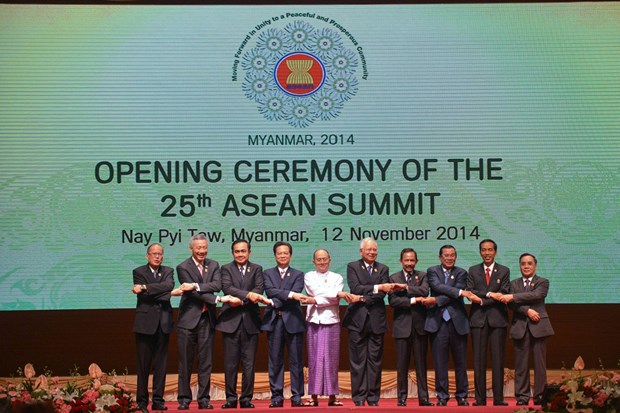 The opening ceremony of the 25th ASEAN Summit in Myanmar in 2014 (Source: VNA)
The opening ceremony of the 25th ASEAN Summit in Myanmar in 2014 (Source: VNA)
Trust should be nurtured with a sincere attitude, on the basis of international law, heightening each nation’s responsibility, stepping up co-operation and harmoniously sharing benefits. From this approach, Prime Minister Nguyen Tan Dung called for eliminating the idea of “winner – loser” for the sake of prosperity of the whole region. The Government leader stressed that “Despite their scales, nations must have equal relations, mutual respect and, more importantly, they should have reciprocally strategic trust.”
In the face of emerging challenges and complicated, unpredictable developments in the region and the world, the principle of consensus, built on the basis of mutual trust, is seen as a “colloid” to connect nations, allowing ASEAN to develop with “unity in diversity”. In this process, co-operation mechanisms such as the ASEAN Regional Forum (ARF), the East Asia Summit (EAS) and the ASEAN Defence Ministers Meeting Plus (ADDM+) have promoted multilateral security co-operation, built up trust and helped solve global issues.
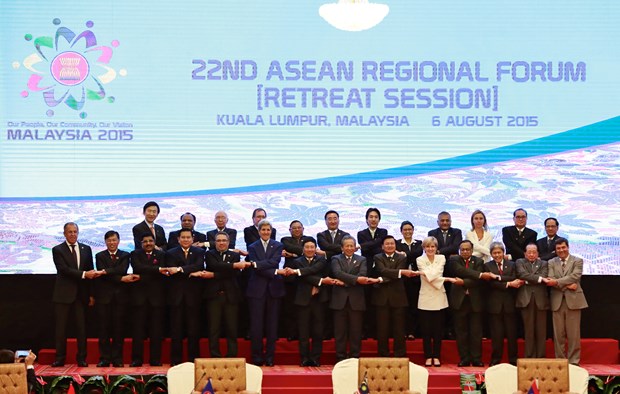 The 22nd ASEAN Regional Forum in Malaysia in 2015 (Source: VNA)
The 22nd ASEAN Regional Forum in Malaysia in 2015 (Source: VNA)
The year 2015 marks the 20 th anniversary of Vietnam’s accession to ASEAN. During the past two decades, Vietnam has spared no efforts for the association’s development. The country has been fully aware of the importance of maintaining peace, stability, friendship and co-operation. Based on this motto, Vietnam has joined hands with the other ASEAN member nations to step up co-operation, consolidate solidarity and unity within the bloc, maintain the grouping’s central role in the regional architecture, and speed up the establishment of the ASEAN Community by the end of this year.
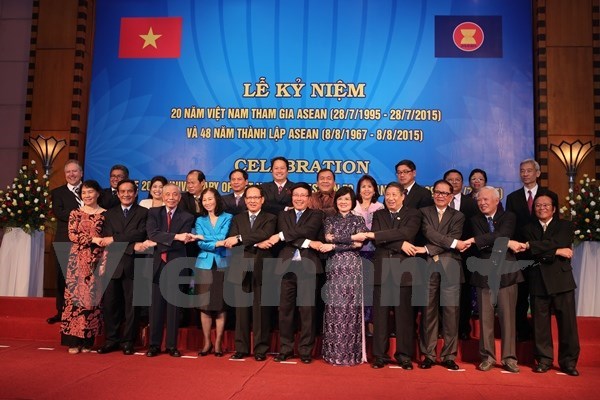 The celebration of the 20th anniversary of Vietnam's joining the ASEAN (Source: VNA)
The celebration of the 20th anniversary of Vietnam's joining the ASEAN (Source: VNA)
With a desire to be a friend and a reliable partner of all nations across the world, Vietnam has done its utmost to deepen mutually-beneficial partnership and cooperation relations. Vietnam already established strategic partnerships with three ASEAN member countries, namely Thailand, Indonesia and Singapore, laying a firm foundation for durable relationships in the bloc.
“Building up strategic trust”, an initiative proposed by Prime Minister Nguyen Tan Dung at the 12 th Shangri-La Dialogue, is a policy for the Southeast Asian nations to study and implement. Upholding close relations based on mutual trust, this will be a solid foundation for the “ASEAN common house” and for the sake of peace, security, stability and prosperity in the region.
By: Phuong Chi-Thanh Quynh-Huy Hiep









